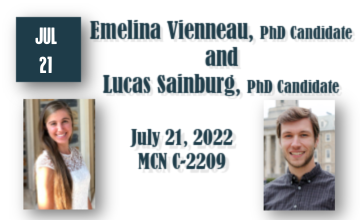VISE Summer Research In Progress (RiP) Series 7.21.22
VISE Summer Seminar to be led by
Lucas Sainburg (BME), PhD Candidate
and
Emelina Vienneau (BME) PhD Candidate

Date: Thursday, July 21, 2022
Time: 11:45 am Room Admittance, noon start
Location: MCN C-2209
Speaker #1: Lucas Sainburg, PhD Candidate, Department of Biomedical Engineering
RiP #1: Title: Effects of temporal lobe epilepsy and surgical treatment on functional MRI activity in brain networks
RIP #1 Description: Approximately 40% of temporal lobe epilepsy (TLE) are drug-refractory, indicating them for further treatments such as surgical resection of the epileptic focus. However, 27-42% of these patients still don’t achieve freedom from disabling seizures after surgery. This highlights the need for a better understanding of TLE, improved biomarkers to guide treatment, and a more thorough understanding of these treatments’ effects on the brain. In this talk I will describe how we are using functional and diffusion MRI to gain a better understanding of TLE as a brain network disorder, as opposed to a solely focal disorder, and how surgical treatment perturbs these networks.
Lucas Sainburg received his BS in Biomedical Engineering from the Pennsylvania State University in 2020, where he first began studying the brain using functional MRI. He now works with Dr. Victoria Morgan at Vanderbilt, employing functional and diffusion MRI to study the effects of focal epilepsy and its treatments on the brain.
Speaker #2: Emelina Vienneau, PhD Candidate, Department of Biomedical Engineering
RiP #2: Coded Excitation for High SNR Transcranial Ultrasound Imaging
RIP #2 Description: Functional ultrasound imaging (fUSI) is an emerging neuroimaging modality that visualizes changes in cerebral blood volume in real-time and has shown great promise in preclinical animal models. However, clinical translation of noninvasive, transcranial fUSI (tfUSI) remains an unsolved challenge due to the attenuation from the skull. In this talk I will present a coded excitation framework that I developed to overcome the attenuation of the skull and visualize blood flow noninvasively, demonstrating for the first time that tfUSI may be possible in humans too.
Emelina Vienneau is a rising 5th-year PhD Candidate in Biomedical Engineering working with Dr. Brett Byram. She is a recipient of the NSF Graduate Research Fellowship, the Provost Graduate Fellowship, the Harold Stirling Vanderbilt Award, and the Sidney P. Colowick Graduate Student Scholarship. She was also on the VISE T32 Training Grant for Innovative Research in Surgery and Engineering and holds a certificate in Surgical and Interventional Engineering.
